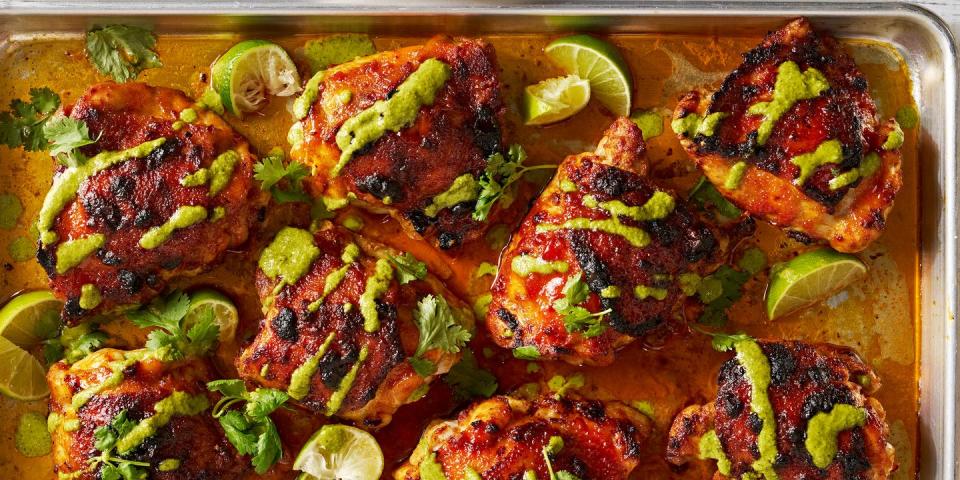Don't Break The 5 Golden Rules Of Marinating Chicken
We’re a nation of chicken lovers, but sometimes even our chicken recipes need a little lift. Cue the marinade. This flexible, hands-off technique can take your weeknight chicken from good to great in less than an hour.
What Marinades Actually Do
Marinades infuse the chicken with flavor. Any herbs, spices, and aromatics will season the surface of the chicken, while the salt in the marinade will permeate the chicken’s interior, seasoning it from the inside out.
Marinades also improve your chicken’s texture. According to Jessica Gavin, certified culinary scientist, the salt in the marinade improves the chicken’s “moisture retention” and will “restructure and loosen the muscle fibers.” This results in juicier chicken. Marinades also enhance the chicken’s appearance, because the sugars in the marinade help it brown more easily while it cooks.
Contrary to popular belief, marinades do not necessarily tenderize chicken. The acid in the marinades can start breaking down the chicken’s muscle fibers if it's exposed for too long, but this is technically called denaturing, not tenderizing.
Marinating chicken isn’t hard or complicated; you honestly don’t even need a recipe. But there are some core basics to keep in mind. Here are five golden rules that will make marinating chicken feel like a breeze.
Pick Your Ideal Cut of Chicken
Any cut of chicken can benefit from a marinade, but boneless skinless chicken breasts have the most to gain. As the leanest cut that dries out most easily while cooking, their texture can improve significantly from the enhanced moisture retention. Also, since they don’t have a lot of fat to bring flavor, they’re a great blank canvas for whatever flavors the marinade is packing.
Dark meat like thighs or drumsticks will also absorb a marinade well. Gavin says that their added fat can pull more “fat-soluble flavors… into the meat for tastier bites." But they also require a “longer marination time” to get the full benefits. So if you’re in a hurry, chicken breast might be your best bet.

Ingredients to Add to Your Chicken Marinade
You don’t need a recipe to make a killer marinade, but there are certain types of ingredients you’ll always want to include.
Fat is key in a marinade because it helps to carry the other flavors present throughout the chicken. While oil is typically the fat of choice, the type of oil is totally up to you. Try olive oil in a Greek- or Italian-inspired marinade, and stick with a neutral vegetable or grape seed oil for a marinade that includes Tex-Mex or Asian flavors.
Salt is the most important ingredient in the marinade. It permeates the chicken with seasoning while contributing to its juiciness. I typically include a teaspoon of salt per pound of chicken being marinated, but if you’re in doubt, just taste the marinade. If it tastes like it needs salt, add more.
Sugar in the form of honey, maple syrup, or granulated or brown sugar enhances the marinade by balancing the spices and the salt present. It also helps the chicken caramelize as it cooks, which contributes to better flavor and appearance.
Aromatics such as chopped garlic, ginger, or shallots can add a lot of character to the marinade. Hearty herbs and ground spices are also great to include. I typically include at least garlic or shallots, and then add 1-3 additional complementary spices or herbs.
Acid in the form of vinegar or citrus juice is a common addition, as it balances the sugar and oil in the marinade and pops the overall flavor. Use sparingly, since overly acidic marinades can have negative effects on the texture of the chicken.

How Long To Marinate Your Chicken
Chicken is a more delicate protein than steak or pork, so it absorbs marinades much quicker. Longer is not better here, especially if there’s any type of acid or enzyme in the marinade. If the chicken is left sitting in an acidic solution for too long, it will begin to denature the proteins, rendering the surface of the chicken dry and mushy.
To avoid this, Gavin suggests limiting marinade time to 30-60 minutes for any marinades containing acid and 2 hours to 2 days (max!) for marinades that don’t. If you want to include acid in the marinade for flavor, but are hoping for a longer marinade time, Gavin suggests waiting to add the acid until 30 minutes before you intend to cook it. Then you’ll get the benefit of the flavor while simultaneously preserving the texture.
Consider Cutting Up Your Chicken
If you’re in a rush, cutting the chicken into strips or smaller chunks can cut down on the marinating time. This is my go-to when I’m planning to sauté, stirfry, or broil the chicken. Just keep in mind that smaller pieces of chicken might not be the best choice for certain cooking methods, such as grilling or roasting. If you’re planning to use that chicken for a cook-out or as part of a sheet-pan dinner, you’re better off keeping it whole.

Cook It Properly
Cooking marinated chicken is pretty similar to cooking any other chicken, but there are a few things to keep in mind. If the chicken is submerged in a wet solution, it’s wise to let it drip dry before adding it to a hot pan or grill. In most cases, you shouldn’t have to pat it dry. If there is sugar in the marinade, direct cooking methods such as grilling or sautéing might result in more caramelization than you’re used to, so be prepared to transfer larger pieces of chicken to a cooler side of the grill or pop them in the oven to finish cooking as necessary.
Just remember, no amount of increased moisture retention can make up for overcooking your chicken. Keep a probe thermometer handy so you can pull the chicken as soon as it comes to temp. No one wants dry chicken.
You Might Also Like


